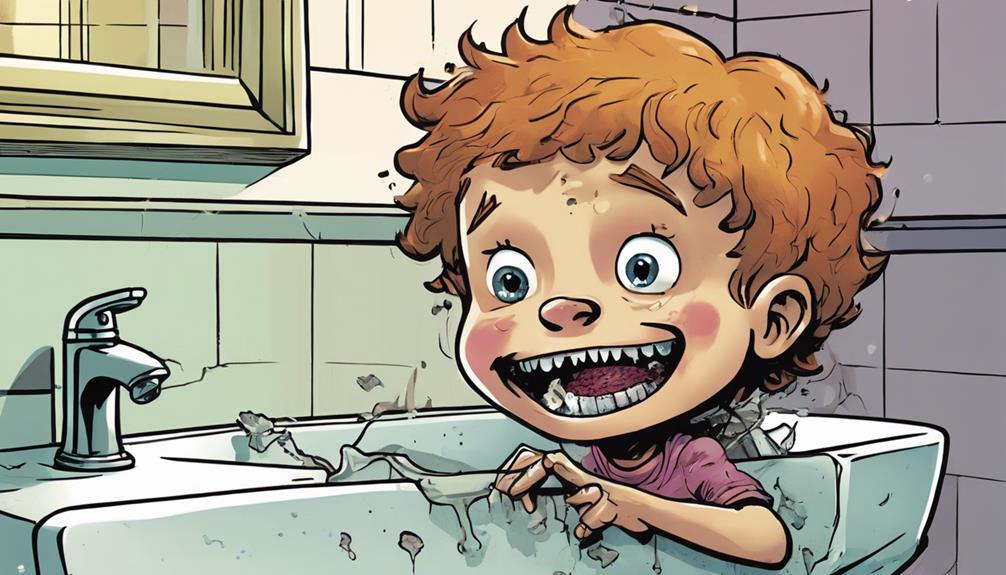You should never let your kids skip flossing because it can lead to serious dental issues. Skipping this step raises their risk of cavities since toothbrushes can't reach all the areas, leaving about 35% of tooth surfaces uncleaned. Plus, neglecting to floss can contribute to gum disease and bad breath, which can affect their confidence. Over time, this pattern of neglect can result in costly dental treatments. Establishing a consistent flossing habit early on helps protect their smiles and overall health. Keep exploring to learn more about the long-term benefits of proper oral care. Teaching kids about the importance of flossing and demonstrating the proper technique is essential for their oral hygiene routine. By emphasizing the benefits of flossing, such as preventing plaque buildup and maintaining healthy gums, you can instill good habits that will last a lifetime. Additionally, regular flossing can also improve their overall health by reducing the risk of systemic diseases such as heart disease and diabetes. Taking the time to educate and encourage your kids to floss can have a lasting impact on their dental health and overall well-being. Furthermore, emphasizing the importance of bedtime oral hygiene is crucial for maintaining healthy teeth and gums. Encourage your kids to brush and floss before bed to remove any food particles and plaque that may have accumulated throughout the day. By making this a part of their nightly routine, you are setting them up for a lifetime of good oral health habits. This consistent care can help prevent tooth decay, gum disease, and other dental issues that can arise from neglecting bedtime oral hygiene.
Key Takeaways
- Skipping flossing increases the risk of cavities due to plaque buildup in hard-to-reach areas between teeth.
- Neglecting flossing can lead to gum disease, which starts with gingivitis and can progress to serious conditions.
- Good oral hygiene, including flossing, helps reduce the risk of heart disease linked to gum inflammation.
- Regular flossing improves tooth appearance by removing plaque and preventing yellowing from trapped food particles.
Increased Risk for Cavities

Neglecting to floss can considerably raise your child's risk of developing cavities. When your child skips flossing, plaque and bacteria build up between their teeth where toothbrushes can't reach. This accumulation leads to the formation of cavities, which can cause pain and even infection. The tight spaces between teeth are often missed by a toothbrush, leaving about 35% of tooth surfaces uncleaned.
If food particles get trapped in these areas, they linger, allowing bacteria to thrive and produce acids that erode tooth enamel. Regular flossing effectively removes plaque and food particles, making it an important part of your child's oral hygiene routine. Without it, you increase the chances of cavities developing, which can have long-term consequences for their dental health.
It's vital to encourage your child to floss daily, making it an integral part of their routine. Teaching them good habits now can help prevent cavities and guarantee their teeth remain healthy. Remember, a little effort in flossing goes a long way in maintaining their oral hygiene and keeping those smiles bright.
Increased Risk for Gum Disease

Skipping flossing not only heightens the risk of cavities but also greatly increases the chances of developing gum disease. When you neglect daily flossing, plaque builds up between your teeth and along the gum line, creating a breeding ground for harmful bacteria. This accumulation can lead to inflammation and infection of your gums, resulting in conditions like gingivitis and periodontitis if left untreated.
Regularly flossing your teeth is essential for maintaining good oral health. It effectively removes food particles and plaque that a toothbrush simply can't reach. By incorporating this simple habit into your routine, you can considerably lower the risk of gum disease, ensuring your teeth and gums stay healthy as you grow.
Moreover, establishing good flossing habits early on can have lasting benefits. Early intervention through consistent flossing decreases the likelihood of developing severe gum conditions in children. As studies show, neglecting to floss allows bacteria to thrive, leading to chronic gum disease.
Connection to Heart Disease

Good oral hygiene, including regular flossing, plays an essential role in reducing your risk of heart disease. When you neglect to floss, the health of your gums can suffer, leading to gum disease. Research shows that gum disease is linked to an increased risk of cardiovascular conditions like heart attack and stroke.
Inflamed gums can allow bacteria to enter your bloodstream, contributing to arterial plaque buildup and hardening your arteries. This connection highlights how important it is to take care of your teeth and gums. Each time you floss, you help minimize the bacterial load in your mouth, thereby lowering your chances of developing heart-related complications.
Moreover, studies indicate that individuals who practice poor oral hygiene, including skipping flossing, may face a higher incidence of cardiovascular issues. By maintaining good oral hygiene through consistent flossing, you're not just caring for your teeth—you're also protecting your heart.
Effects on Tooth Appearance

Flossing regularly enhances the appearance of your teeth by effectively removing plaque and debris that can cause discoloration. When you skip flossing, accumulated food particles between your teeth can lead to a yellow appearance, detracting from your smile.
By incorporating flossing into your daily oral care routine, you help maintain a uniform tooth shade and prevent darkened edges. Flossing targets those hard-to-reach areas that toothbrushes often miss, promoting a brighter and cleaner overall smile.
When you keep your teeth free from debris, you not only enhance their aesthetic qualities but also boost your self-confidence. Consistent flossing contributes greatly to a whiter appearance, ensuring your smile looks its best.
Causes Bad Breath

Trapped food particles between your teeth can decay and lead to bad breath if they aren't removed regularly. When you skip flossing, those particles linger, allowing bacteria to thrive in your mouth. This buildup can cause halitosis, leaving you with an unpleasant odor that can be embarrassing.
Flossing is essential for maintaining good oral hygiene. It reaches areas your toothbrush can't, effectively removing debris and plaque from between your teeth and along the gum line. When you floss daily, you prevent the accumulation of food particles, which helps keep your breath fresh and your gums healthy.
Neglecting to floss allows bacteria to feast on leftover food, leading to a smelly situation. Bad breath isn't just a minor issue; it can affect your confidence and how others perceive you. Regular flossing not only combats bad breath but also promotes overall mouth freshness.
Slippery Slope of Neglect

When you skip flossing just once, it might seem like no big deal, but that small act can lead to a pattern of neglect.
Over time, this inconsistency can weaken your child's oral hygiene habits, increasing the risk of cavities and gum disease.
Establishing a solid routine early on is key to avoiding this slippery slope of neglect.
Habit Formation Challenges
Neglecting to floss even once can set off a chain reaction, making it easier to skip sessions in the future and jeopardizing your child's oral health. Once your child misses a flossing session, they might start to believe that it's okay to neglect dental care. This mindset can lead to consistent avoidance and create a slippery slope of neglect.
Here are some key risk factors that contribute to this issue:
- Perception: Skipping flossing makes it feel acceptable to neglect oral hygiene.
- Accumulation: Plaque builds up in hard-to-reach areas, increasing the risk of cavities.
- Routine Disruption: Missing flossing disrupts the habit of taking care of teeth twice a day.
- Long-term Consequences: Erosion of the habit can lead to costly dental treatments down the line.
To help your child maintain their flossing routine, emphasize the importance of consistency.
Encouraging them to floss daily alongside brushing will bolster their dental care habits, reducing the chances of falling into that slippery slope.
Consequences of Inconsistency
Skipping a flossing session may seem minor, but it can quickly lead to a pattern of neglect that jeopardizes your child's oral health. When your child skips flossing, it becomes easier to miss future sessions, gradually eroding the habit. This inconsistency can cause plaque buildup, which hardens into tartar, making professional cleaning necessary.
Neglecting to floss regularly can lead to cavities and gum disease, as food particles and plaque accumulate in hard-to-reach areas. You might notice signs like bleeding gums or persistent bad breath, indicating deeper issues. These aren't just minor inconveniences; they can develop into painful conditions that require costly dental treatments.
To truly make sure your child's mouth stays healthy, preventive dentistry is essential. Establishing a consistent flossing routine early on sets the stage for lifelong oral health. The more you encourage your child to floss daily, the less likely they'll face serious dental problems down the line.
Frequently Asked Questions
What Happens if Kids Don't Floss?
If you don't floss, food particles and plaque build up between your teeth, increasing your risk of cavities and gum disease. You might also experience bad breath and face higher dental bills in the future.
Is It Okay to Skip Flossing?
"An ounce of prevention's worth a pound of cure." Skipping flossing might seem harmless, but it can lead to plaque buildup and cavities. So, don't skip it—your teeth will thank you later!
Is Flossing Important for Kids?
Flossing's essential for kids' dental health. It prevents plaque buildup, reduces cavity risks, and promotes strong gums. By teaching your child to floss early, you're helping them develop lifelong healthy habits and confidence in their oral care.
What Happens if You Go Years Without Flossing?
If you go years without flossing, plaque builds up, increasing your risk for cavities and gum disease. You might face bad breath, tooth discoloration, and costly dental treatments later on due to untreated issues.
Does Skipping Flossing Have an Impact on Kids’ Teeth According to the Tooth Fairy?
The tooth fairy is always on the lookout for healthy teeth, but skipping flossing can lead to tooth fairy unusual requests. Kids who don’t floss may find that the tooth fairy leaves a smaller reward or even asks for extra chores in exchange for their lost tooth. It’s important to keep those teeth clean!
Conclusion
Skipping flossing is like skipping the last step on a staircase—you might think you're safe, but one misstep can lead to a tumble.
When you neglect those tight spaces between your teeth, you're inviting cavities, gum disease, and even heart issues into your life.
Just like a well-tended garden flourishes, your smile thrives with daily care.
So, don't let flossing be the forgotten step; embrace it to keep your mouth and body healthy for years to come.









